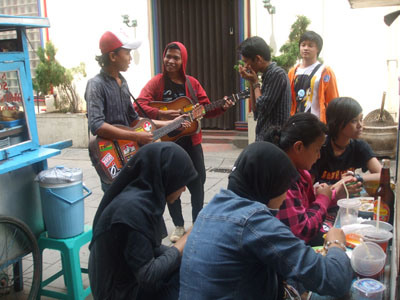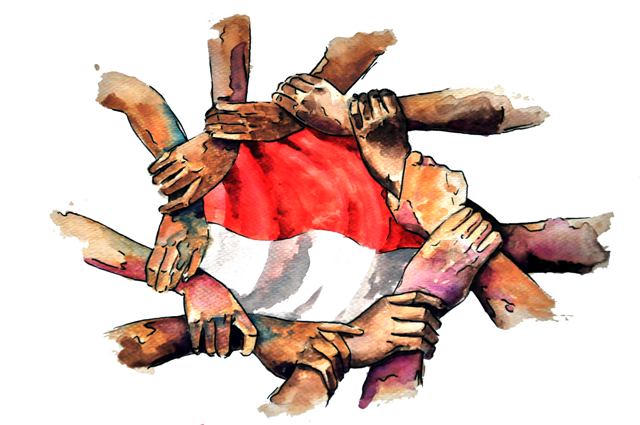Not only is a fighting faith possible, but it may in fact be the most effective vehicle for bringing us closer to a prosperous world.
Every once in a while I am overcome by the realization that the highest form of good I can achieve in my life is to love unconditionally. On the rare occasions when I see this truth clearly, I am taken aback and frankly ashamed of how rarely I am conscious of this ideal. In far too few of my interactions with fellow humans does my heart "burn with loving kindness" (as my Baha'i friends like to say) for everyone I interact with.
I genuinely believe (though rarely remember) that all minor objectives that are worth fighting for in life boil down to this single objective of unconditional love. But don't get me wrong; in our current political and social environment, love cannot be just an escape from oppression but a confrontation of it. Obviously, we do need love in itself in times of hardship, but no, love is not all we need. We also need resistance. We also need organization. We also need vocal and relentless dissent to fascism, bigotry, and all their ugly cousins. This is because we need good schools and good jobs and good healthcare, and we need them to be equally accessible for everyone.
But as I see it, at the end of the day, these goals are still all simply stages and prerequisites to achieve the overarching ideal of love.
When all progress is achieved: a thought experiment
Imagine a world where "progress" succeeds. Obama's "baton" is indeed repeatedly handed off in a relay of socioeconomic progress until, some day, the anchor crosses the finish line. Fukoyama is finally redeemed; history is over. Equality is a social fact. The ghost of Tomi Lahren is uncomfortably quiet because the PC left is no longer “whining.”
Granted, this type of vision of future hardly seems imaginable right about now; I don't know about you, but some of my basic presuppositions about history, progress, and the future of humanity have recently been shaken pretty hard. But, despite the likelihood that there will always be certain groups dominating and exploiting others (or that climate change will lead to a future without humanity), engaging with this imaginary utopia can help us contemplate what our most basic values really are.
I do think it's reasonable to assume that there could be a set of conditions that, if achieved, would render the idea of continued social progress incomprehensible. I obviously can't claim to know what a perfect world / utopia would actually look like—though if you asked me now, I might say something along these lines: the provision of quality education and healthcare to all people in the world; the elimination of all forms of systemic and personal discrimination; the elimination of poverty. Clearly the content of the conditions themselves is subject to debate, but our working assumption here is that there are—in the abstract—conditions that would fulfill requirements for "utopia."
So once those "created equal" are actually treated equally, what's next? We'd guess that a strict Marxist would essentially retire. If our end-game is defined by material conditions alone, then there’s nothing left to fight for. Even more contemporary socialists, who incorporate more than money and capital into analysis of power relations, would basically have their cause solved at this point. They could essentially just sit back and enjoy utopia.
In my mind, however, the next frontier must be altruism. Once we've learned not to value certain fellow humans over others, the goal posts should naturally shift to not even valuing ourselves over fellow humans. Just like the utopia itself, I am not claiming that this widespread altruism is actually achievable, but it is certainly an ideal that can be approached.
The alternative to this vision of altruism would be an individualistic and hedonistic leftism, where the ultimate goal would be to create a world in which people had equal opportunity, but in which the common person felt no individual responsibility to maintain the wellbeing of their fellow humans. I believe that this would bring us to a world where we are indeed equal but not fully prosperous.
In this context, prosperity is not complete with just economy or physical well being (as this would obviously already be achieved in our imaginary utopia). Instead, by prosperity, I mean the realization of communities of people that are happy, fulfilled, and have support from loved ones. To achieve this kind of prosperity, we would need to love each other, nurture and support each other, encourage creativity, embrace difference, and welcome excellence in all its forms.
Love as a goal
As I see it, this prosperity would be built through a culture of altruism. The principles of this altruism would need to be founded on mutual love. Practically, this type of mutual love is most readily found in religious belief systems.
To create a fully prosperous world would necessarily require altruism. Altruism, in allowing us to care about the welfare of others as we would ourselves, enables the creation of social support networks that go beyond the limits of narrow self-interest. If we were willing to make minor sacrifices so that others could make major gains—a fairly frequent condition—we would logically be able to collectively accomplish much more.
This type of altruism would be enabled by love as a motivating factor. As Freud said, “At the height of being in love the boundary between ego and object threatens to melt away”—i.e. love creates altruism. This love would be conceptualized in the form of universal human solidarity. The limits of this solidarity would need to surpass most existing models like tribalism or nationalism, which still find some humans to designate as Other. While history is rife with examples of those who were altruistic for the sake of their particular group, only truly universal love would transcend all boundaries. (Let’s take another moment to remember that while this is realistically an unachievable ideal, in pinpointing that ideal we may attempt to approach it.)
Ultimately, the greatest potential for building such an ethos of universal love lies in religious belief. Despite the current weakness of most faith-based leftist movements (on which more later), faith-based traditions are rich with radical political ideas, calls to altruism, and messages of unconditional love. In Matthew 19:21, Jesus preached that “If you want to be perfect, go, sell your possessions and give to the poor." I would even include humanism under the umbrella of “religious belief” (on the condition that it finds a way to command the type of dedication that historically only religion, tribalism, and nationalism have); indeed, Voltaire wrote, “Every man is guilty of all the good he did not do.” Only in such a morally demanding belief system—regardless of whether we find in it origin stories and the Almighty—do we find the means capable of engendering a culture of mutual love that can open the door to widespread altruism.
Love as method
If love is our (ultimate) goal, then I think it’s worth briefly discussing the role and importance of love as a method towards reaching that goal. As a means to achieve the egalitarian, prosperous, and loving world we strive for, we can’t forget to be loving along the way as well. The Dhammapada reminds us that “hatred does not cease by hatred at any time: hatred ceases by love, this is an eternal rule.”
While this sentiment clearly sounds nice, there are also concrete ways in which this principle manifests in current social struggles. Research shows that if we actually want to reduce bigotry, in most cases the most effective way to do so is not by calling people out for being bigots, but by constructively engaging with these people and reminding them of the humanity and inherent dignity of all people. (Obviously, the burden of such patient engagement should fall primarily on the shoulders of allies rather than the targets of bigotry themselves.)
While the role for love in the realm of interpersonal relationships is fairly evident, it may be harder to employ when dealing with larger structural issues. Certainly, we should not even imagine that indigenous Americans would have been able to disrupt construction of the Dakota Access Pipeline through reasoned appeals to the government. Here though, we can remember that aggressive, harsh action is often required, but that doesn’t require us to hold hatred towards any person. In Gandhi’s description of “the devotee” (which I hope he would not object to us equating here with “the activist”) he calls them “versed in action and yet unaffected by it.” This detachment and commitment to love is certainly not necessary for an activism—hate towards oppressors has undeniably accomplished tons historically—, but I personally believe it to at least be beneficial to the activist themself.
Opening the Door to Faith-Based Resistance
On the night of the presidential election, Brookings scholar Shadi Hamid wrote on Twitter, “We need a fighting faith,” lamenting the impotency of political liberalism in the face of fascism [my wording]. This criticism realistically extends to secular leftism as well. We forfeit a large amount of rallying potential when we abandon the concept of Truth. If Truth doesn’t exist, we’re left with moral relativism, and in a world where what’s right is completely subjective, then is any of this really worth all the fuss?
In long-run, center-left managerial technocracy won't defeat ideology, religion & identity. We need a fighting faith. Back to drawing board— Shadi Hamid (@shadihamid) November 9, 2016
Of course, there have been and there are fighting faiths. Liberation theology in Latin American saw Christ as a revolutionary figure. Gandhi rallied millions with his concept of Satyagraha, a social movement explicitly grounded in a Truth-claim. Ali Shariati wrote of “Red Shi’ism” and conceptualized tawḥīd as a liberating ideology.
Despite the historical prevalence and success of fighting faiths, they are currently undeniably weak. I see this situation as based on a few different factors. First off, Marx calling religion an “opiate” was certainly not helpful to the spread of his ideas among the passionately religious. Recent history has also frequently pitted these groups against each other, with the Cold War positioning the Godless socialists against the God-fearing capitalists (which may in itself happen to be an inheritance from that momentous statement from Marx). At an American domestic level as well, however, moneyed interests were working to forge a Christian creed of libertarianism in order to fight unions and the welfare state. As a result, the reality we all live in is one where, ironically, to have faith is rarely to fight. And even if it is, fighting for one’s faith is almost always seen as fighting for one’s religious identity—defending Islam from Ahok’s “blasphemy”—and far less frequently includes a struggle for the ideas of justice and equality essential to religious teaching. What we are left with is the widespread impotence of religion in the field of social progress.
But alas, this essay strives to emphasize that not only is a fighting faith possible, but it may in fact be the most effective vehicle for bringing us closer to a prosperous world.
Yes, there are plenty of leftists (me included) who do not consistently manifest this ideal of unconditional love. Neither do the majority of religious people (again, me included). But in forgetting that love is (can be? should be?) both the foundation and the aspiration of these two projects, we sell short each of their potentials.
Post-script: reflections
I wrote this with two audiences in mind: the left and the religious.
As for the left, this is certainly not an attempt to convert secular leftists into any specific religious stream of thought. It is, however, a call for contemplation about what our basic values should be and how we can effectively spread and socialize these values.
As for the religious, this is indeed an attempt to convert people of faith to the left. In my reading of most faith traditions, I find abundant support for radical political ideas and the rejection of hedonism, materialism, and even capitalism. Except in the case of those few who take a religiously-principled quietist stance, I generally believe that most religious non-radicals would be radical (in the good way, obviously) if they reflected honestly about what their faith demands of them.
Evidently, I am far more zealous about politics than religion.
Evidently, I am far more zealous about politics than religion.

















